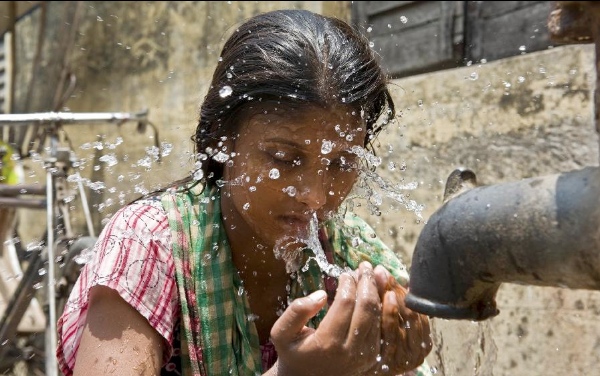As thousands die and roads melt in India’s sweltering heat wave and reports file in predicting the imminent collapse of Antarctica’s 12,000 year-old Larson B Icesheet, the Bonn Talks commence next Monday. Unfortunately, they begin with scientists weighing in on the dangerously insufficient ambition of developed countries’ Intended Nationally Determined Contributions (INDCs), national plans to limit global warming to below 2°C relative to pre-industrial levels.
To date, 37 countries have submitted their INDCs, designed to allow each country to develop a customized climate action plan informed by its particular circumstances as part of the global framework.
“Storms are happening now, droughts are happening now, we demand action now. People are not going to settle for the very weak proposals we are seeing for 2025 and 2030,” says Lidy Nacpil, Coordinator of the Asian Peoples Movement on Debt and Development Movement. “With current 2020 pollution targets, combined with the frighteningly weak 2025 proposals, it looks like the Paris Agreement will be historic for locking us in to as much as 4C of warming. Governments must know that scientifically, legally, and morally the test for Paris is action in the pre-2020 period. From the Philippines the simple test of these talks are: will pollution targets get stronger and will finance and technology be transferred to those who need it.”
While the Bonn negotiations hone in on providing clear-cut options for governments to adapt renewable solutions programs, the call to elevate the significance of agriculture in the negotiations and the treaty is gaining momentum. The challenge to feed a global population projected to reach 9.6 billion by 2050 presents what experts believe to be the most significant challenge as temperatures continue to rise at a unprecedented rate each year.
To elevate the role of sustainable agriculture in the negotiating process, Farming First has released an updated interactive toolkit, providing indisputable evidence of the significance of agriculture in national economies, food security, adaptation and mitigation.
The “Guide to Negotiations on Agriculture and Climate Change”, produced by CGIAR Research Program on Climate Change, Agriculture and Food Security (CCAFS) and CTA, provides a template and a rationale for governments to incorporate agriculture in their action plans.
[list type=”caret”]
- To meet global food demand by 2050, agricultural production increase by 60%.
- Agriculture makes the greatest contribution to total food system emissions—equivalent to 14–24% of total global emissions.
- 265 million people will face a 5% decrease in growing season in the next 40 years
- Every one US dollar invested in anticipatory measures for climate adaptation initiatives is estimated to save up to 7 US dollars in future relief costs.
[/list]
Along with its updated overview of the growing prominence of agriculture in several UNFCCC committees, the toolkit includes factsheets, FAQs, websites, infographics, briefs & papers along with clear suggestions for messaging at the Bonn Conference and as part of the entire UNFCCC process.
The Paris Talks, represent the deadline set forth in the 2011 Durban Platform for governments to ratify a climate deal which will be legally enforced by 2020, a deal which elevates targets for cutbacks on GHG emissions, promotes renewable energy solutions and provides pre-2020 finance.
Developing countries are stressing the urgency for next week’s talks to include a “multilateral review” of countries’ current 2020 pollution targets and finance levels.
“The leaders of the richest countries in the world are meeting simultaneously in Germany at the G7 and they must have climate on their agenda,” says Azeb Germai of LDC-Watch in Ethiopia. “We cannot wish away the climate crisis, it will take real effort and real commitment. That means a real commitment to stop funding dirty energy and to start funding the energy systems that people in Ethiopia and across Africa need. If there is no commitment on finance for renewable energy access, or to prepare our crops for warmer temperatures then there will be no deal worth the name.”


